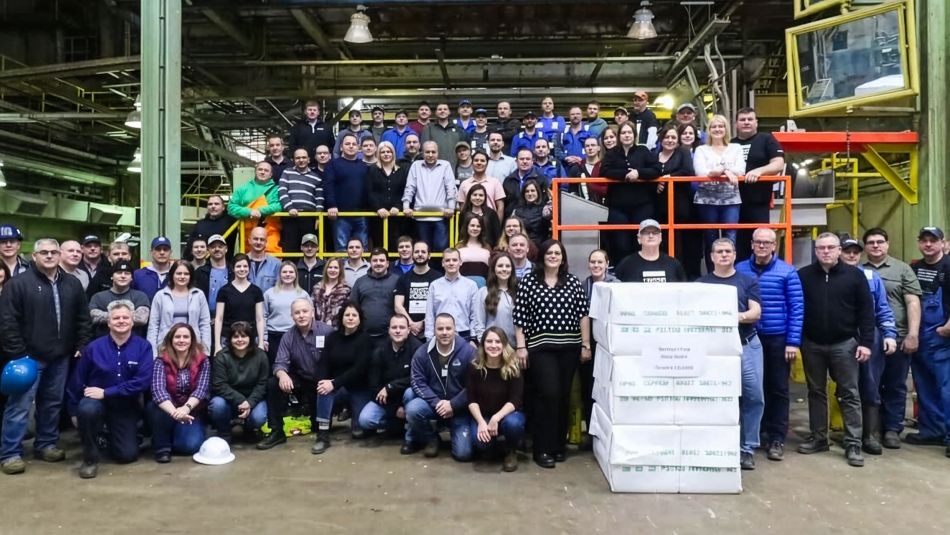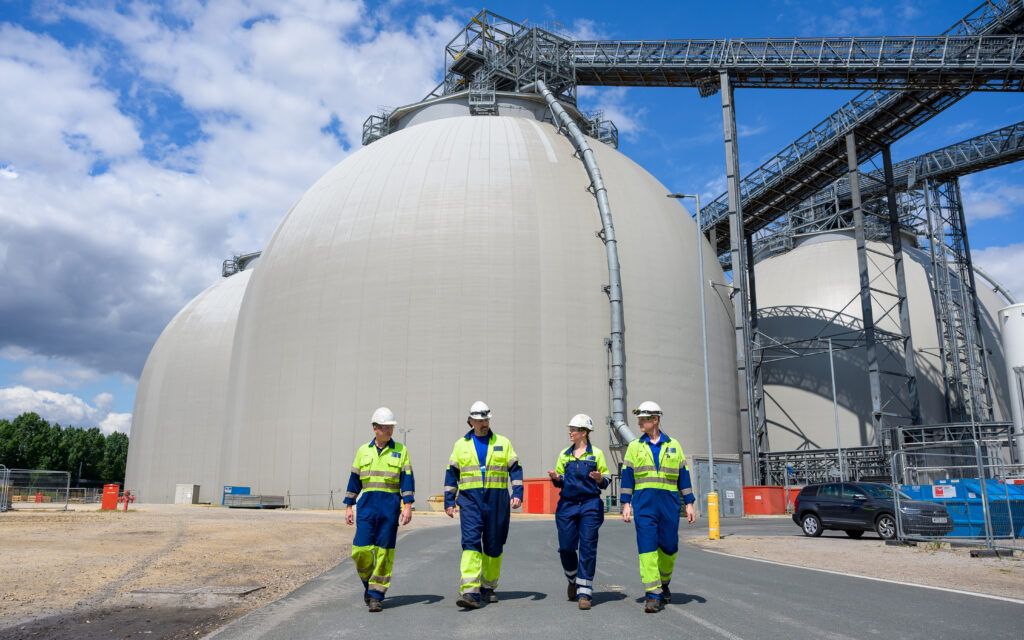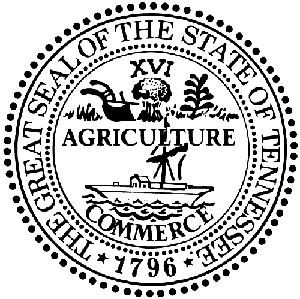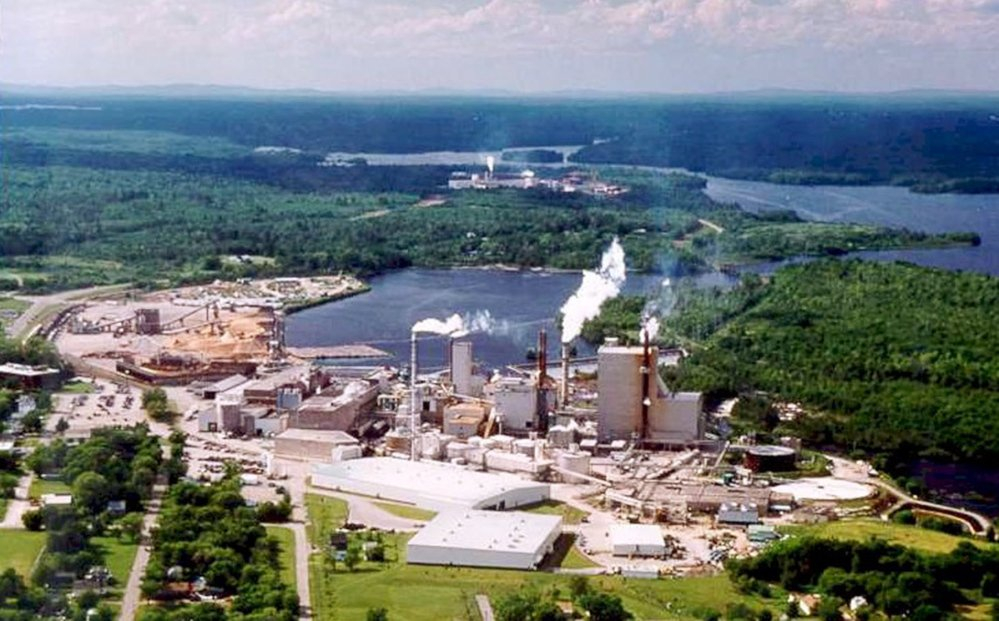 Canada and the U.S. will launch formal discussions to review their free trade agreement in mid-January, the office of Canadian Prime Minister Mark Carney said. The prime minister confirmed to provincial leaders that Dominic LeBlanc, the country’s point person for US-Canada trade relations, “will meet with U.S. counterparts in mid-January to launch formal discussions”. …Carney met with the leaders of Canada’s provinces on Thursday to give them an update on trade talks. Canada is one of the most trade-dependent countries in the world, and more than 75% of Canada’s exports go to the country’s southern neighbor. But most exports to the US are currently exempted by USMCA. …Canada is the top export destination for 36 US states. Nearly $3.6 billion Canadian worth of goods and services cross the border each day. About 60% of US crude oil imports are from Canada, as are 85% of US electricity imports.
Canada and the U.S. will launch formal discussions to review their free trade agreement in mid-January, the office of Canadian Prime Minister Mark Carney said. The prime minister confirmed to provincial leaders that Dominic LeBlanc, the country’s point person for US-Canada trade relations, “will meet with U.S. counterparts in mid-January to launch formal discussions”. …Carney met with the leaders of Canada’s provinces on Thursday to give them an update on trade talks. Canada is one of the most trade-dependent countries in the world, and more than 75% of Canada’s exports go to the country’s southern neighbor. But most exports to the US are currently exempted by USMCA. …Canada is the top export destination for 36 US states. Nearly $3.6 billion Canadian worth of goods and services cross the border each day. About 60% of US crude oil imports are from Canada, as are 85% of US electricity imports.
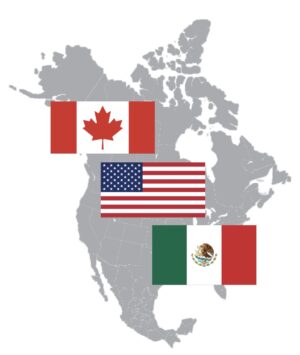 Prime Minister Mark Carney says U.S. President Donald Trump hasn’t given him any indication that he’s willing to walk away from the North American free trade deal that was struck during his first term at the White House. Carney met privately with Trump and Mexican President Claudia Sheinbaum in Washington during the FIFA World Cup draw earlier this month. Much of that conversation laid out the broad strokes for coming discussions around the Canada-U.S.-Mexico Agreement (CUSMA), which is up for review in 2026. …U.S. Trade Representative Jamieson Greer recently floated the possibility of the U.S. aiming to get separate deals with Canada and Mexico — or possibly backing out entirely. …In a report tabled in the U.S. Congress on Wednesday, Greer wrote that he “will keep the president’s options open, negotiating firmly to resolve the issues identified, but only recommending renewal if resolution can be achieved.”
Prime Minister Mark Carney says U.S. President Donald Trump hasn’t given him any indication that he’s willing to walk away from the North American free trade deal that was struck during his first term at the White House. Carney met privately with Trump and Mexican President Claudia Sheinbaum in Washington during the FIFA World Cup draw earlier this month. Much of that conversation laid out the broad strokes for coming discussions around the Canada-U.S.-Mexico Agreement (CUSMA), which is up for review in 2026. …U.S. Trade Representative Jamieson Greer recently floated the possibility of the U.S. aiming to get separate deals with Canada and Mexico — or possibly backing out entirely. …In a report tabled in the U.S. Congress on Wednesday, Greer wrote that he “will keep the president’s options open, negotiating firmly to resolve the issues identified, but only recommending renewal if resolution can be achieved.” The trade war launched by Donald Trump continues to intensify, striking Canadian workers. In addition to the 50% tariffs on steel and aluminum imposed earlier this year and the duties on non-CUSMA-compliant automobiles and parts, Washington added a 50% tariff on copper in July. More recently, a new 10% duty on softwood lumber was introduced, on top of the existing countervailing and anti-dumping duties. …Thanks to the mobilization and constant pressure of the United Steelworkers, several long-standing union demands have finally been adopted in Ottawa. …The federal government announced that it will now require the use of Canadian-made products in publicly funded projects and has announced new investments to strengthen Canada’s industrial capacity and the resilience of our supply chains. …Canada must go further and adopt a strong industrial strategy to reduce our dependence on the U.S. market, protect jobs, and ensure that we never again find ourselves in such a vulnerable position.
The trade war launched by Donald Trump continues to intensify, striking Canadian workers. In addition to the 50% tariffs on steel and aluminum imposed earlier this year and the duties on non-CUSMA-compliant automobiles and parts, Washington added a 50% tariff on copper in July. More recently, a new 10% duty on softwood lumber was introduced, on top of the existing countervailing and anti-dumping duties. …Thanks to the mobilization and constant pressure of the United Steelworkers, several long-standing union demands have finally been adopted in Ottawa. …The federal government announced that it will now require the use of Canadian-made products in publicly funded projects and has announced new investments to strengthen Canada’s industrial capacity and the resilience of our supply chains. …Canada must go further and adopt a strong industrial strategy to reduce our dependence on the U.S. market, protect jobs, and ensure that we never again find ourselves in such a vulnerable position. 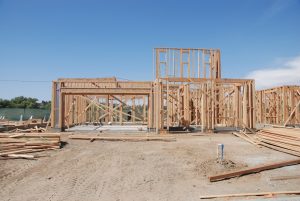 The federal government’s “Buy Canadian” policy for procurement for large infrastructure and defence projects kicked in on Tuesday as the U.S. trade war continues, Procurement Minister Joël Lightbound says. The policy was announced by Prime Minister Mark Carney in September and is essentially a mandate for the federal government to source components used in major government projects from domestic manufacturers. The procurement policy will extend immediately to government contracts valued at $25 million and over, but will expand to contracts valued at $5 million and over by the spring of 2026, Lightbound said. …Additionally, large federal construction and defence projects valued at $25 million or more will be required to use Canadian-produced steel, aluminum and wood products where the basic supply is available, he added. …In July, Carney had announced Canada would “restrict and reduce foreign steel imports entering the Canadian market.” In August, the policy was extended to Canadian lumber.
The federal government’s “Buy Canadian” policy for procurement for large infrastructure and defence projects kicked in on Tuesday as the U.S. trade war continues, Procurement Minister Joël Lightbound says. The policy was announced by Prime Minister Mark Carney in September and is essentially a mandate for the federal government to source components used in major government projects from domestic manufacturers. The procurement policy will extend immediately to government contracts valued at $25 million and over, but will expand to contracts valued at $5 million and over by the spring of 2026, Lightbound said. …Additionally, large federal construction and defence projects valued at $25 million or more will be required to use Canadian-produced steel, aluminum and wood products where the basic supply is available, he added. …In July, Carney had announced Canada would “restrict and reduce foreign steel imports entering the Canadian market.” In August, the policy was extended to Canadian lumber.
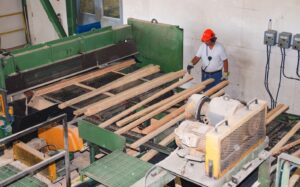 “We’re just waiting for the dust to settle.” That sentiment was expressed recently by Nick Arkle, CEO of Gorman Bros., regarding the current 45% tariff on Canadian lumber exported to the US. In other words, what the industry is seeking more than anything else is clarity. …Complicating this scenario for lumber producers—and one that should not and cannot be overlooked—is provincial government policy, especially in BC, Ontario and Quebec. …If there is a potential silver lining in Canada to the ongoing tariff soap opera, it’s the promise by the Canadian Liberal government to build 500,000 new, affordable homes per year, thus theoretically creating significant domestic demand for building materials like softwood lumber. …While the experts are skeptical that the federal government will meet its goal of building 500,000 new homes per year… it will be worthwhile watching to see if Canadian softwood lumber producers will step up and benefit from this initiative.
“We’re just waiting for the dust to settle.” That sentiment was expressed recently by Nick Arkle, CEO of Gorman Bros., regarding the current 45% tariff on Canadian lumber exported to the US. In other words, what the industry is seeking more than anything else is clarity. …Complicating this scenario for lumber producers—and one that should not and cannot be overlooked—is provincial government policy, especially in BC, Ontario and Quebec. …If there is a potential silver lining in Canada to the ongoing tariff soap opera, it’s the promise by the Canadian Liberal government to build 500,000 new, affordable homes per year, thus theoretically creating significant domestic demand for building materials like softwood lumber. …While the experts are skeptical that the federal government will meet its goal of building 500,000 new homes per year… it will be worthwhile watching to see if Canadian softwood lumber producers will step up and benefit from this initiative.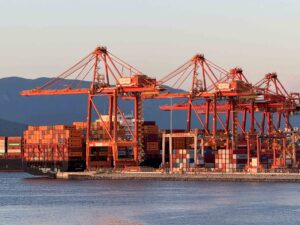 Canada-US Trade Minister Dominic LeBlanc says the door is open for American officials to restart trade talks with Canada. …”Canada believed it was making progress with the Americans — and talks would eventually move to automobiles and softwood lumber — but Trump “decided to suspend those negotiations. That’s regrettable.” …Canadian, American and Mexican officials are gearing up to review CUSMA, which offers Canada crucial protection from many of U.S. President Donald Trump’s tariffs. …On Thursday, Canada’s ambassador to the U.S. Kristen Hillman downplayed signals from the Trump administration about breaking down the trilateral pact and said she hasn’t “heard any indication from the US side that they want to change that foundation.” …All three countries must indicate by July 1 of next year whether they want to extend the agreement, renegotiate its terms or let it expire. LeBlanc said in private the conversations are “much more reassuring” about CUSMA.
Canada-US Trade Minister Dominic LeBlanc says the door is open for American officials to restart trade talks with Canada. …”Canada believed it was making progress with the Americans — and talks would eventually move to automobiles and softwood lumber — but Trump “decided to suspend those negotiations. That’s regrettable.” …Canadian, American and Mexican officials are gearing up to review CUSMA, which offers Canada crucial protection from many of U.S. President Donald Trump’s tariffs. …On Thursday, Canada’s ambassador to the U.S. Kristen Hillman downplayed signals from the Trump administration about breaking down the trilateral pact and said she hasn’t “heard any indication from the US side that they want to change that foundation.” …All three countries must indicate by July 1 of next year whether they want to extend the agreement, renegotiate its terms or let it expire. LeBlanc said in private the conversations are “much more reassuring” about CUSMA. This infographic, released December 12, 2025, provides an overview of the lumber industry, showcasing key metrics and trends related to production, exports and price change. It highlights significant data points, illustrating the state of the market and offering insights into the current landscape of lumber in Canada.
This infographic, released December 12, 2025, provides an overview of the lumber industry, showcasing key metrics and trends related to production, exports and price change. It highlights significant data points, illustrating the state of the market and offering insights into the current landscape of lumber in Canada.
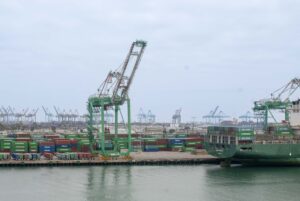 The Office of the US Trade Representative (USTR) held a hearing regarding the six-year review of the United States-Mexico-Canada Agreement (USMCA). Though some stakeholders advocated for maintaining the current framework, many called for targeted updates. Despite varied perspectives, there was broad consensus that USMCA should be preserved. Transshipment and circumvention of Section 232 tariffs emerged as recurring concerns, particularly from the automotive, steel and aluminum, and wood and lumber sectors. …Stakeholders from the wood products, millwork and cabinetry industries raised serious concerns about how USMCA’s current rules of origin are being exploited to circumvent U.S. trade remedies and undermine domestic manufacturers. …The organization’s representative urged the adoption of Labor Value Content (LVC) rules for wood products modeled after those used in the automotive sector to ensure that qualifying goods reflect substantial North American production and fair labor practices.
The Office of the US Trade Representative (USTR) held a hearing regarding the six-year review of the United States-Mexico-Canada Agreement (USMCA). Though some stakeholders advocated for maintaining the current framework, many called for targeted updates. Despite varied perspectives, there was broad consensus that USMCA should be preserved. Transshipment and circumvention of Section 232 tariffs emerged as recurring concerns, particularly from the automotive, steel and aluminum, and wood and lumber sectors. …Stakeholders from the wood products, millwork and cabinetry industries raised serious concerns about how USMCA’s current rules of origin are being exploited to circumvent U.S. trade remedies and undermine domestic manufacturers. …The organization’s representative urged the adoption of Labor Value Content (LVC) rules for wood products modeled after those used in the automotive sector to ensure that qualifying goods reflect substantial North American production and fair labor practices. For Crofton mill workers it was like getting a lump of coal in their stockings. Last week owners of the Domtar pulp mill announced they were shuttering the operation …Who and what is to blame is a complicated tangle, encompassing questions about the future of the forest industry in this province. …While we must confront these questions, the closure also highlights the dangers of community dependence on a particular operation, or even industry. While the workers will, of course, be the most affected, North Cowichan residents will also feel the pain from the mill closure, as it is the municipality’s single biggest taxpayer. ….We can all hope that there will still be a future for the Crofton mill site… but that’s in no way a given. The municipality will be facing some very difficult decisions about services and what it can afford. The larger community will also feel the loss of all of those well paying jobs.
For Crofton mill workers it was like getting a lump of coal in their stockings. Last week owners of the Domtar pulp mill announced they were shuttering the operation …Who and what is to blame is a complicated tangle, encompassing questions about the future of the forest industry in this province. …While we must confront these questions, the closure also highlights the dangers of community dependence on a particular operation, or even industry. While the workers will, of course, be the most affected, North Cowichan residents will also feel the pain from the mill closure, as it is the municipality’s single biggest taxpayer. ….We can all hope that there will still be a future for the Crofton mill site… but that’s in no way a given. The municipality will be facing some very difficult decisions about services and what it can afford. The larger community will also feel the loss of all of those well paying jobs.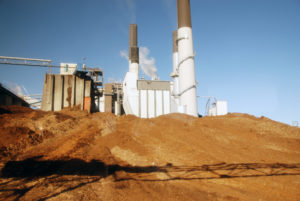 NANAIMO — Exploratory discussions around potentially restricting industrial business activities in Nanaimo irked representatives of Nanaimo Forest Products (NFP), which operates Duke Point’s Harmac Pacific pulp mill. The narrowly approved Nov. 17 notice of motion from Nanaimo city councillor Paul Manly. …Harmac Pacific is actively attempting to rezone a pair of adjacent Phoenix Way lots involving a combined 244 acres bordering Cedar’s Cable Bay Trail. “If this bylaw were to become a reality, it would threaten the ability of our business to continue. …Mayor Leonard Krog is heavily opposed to the motion. “This motion basically says to anyone who wants to invest in this community ‘Don’t bother going to Nanaimo, don’t bother worrying about whether the land is zoned for heavy industry because Nanaimo wants to limit everything that might actually create some real jobs…’” …Harmac Pacific employs roughly 340 employees at its specialty pulp operation, which features a unique employee-owned ownership model.
NANAIMO — Exploratory discussions around potentially restricting industrial business activities in Nanaimo irked representatives of Nanaimo Forest Products (NFP), which operates Duke Point’s Harmac Pacific pulp mill. The narrowly approved Nov. 17 notice of motion from Nanaimo city councillor Paul Manly. …Harmac Pacific is actively attempting to rezone a pair of adjacent Phoenix Way lots involving a combined 244 acres bordering Cedar’s Cable Bay Trail. “If this bylaw were to become a reality, it would threaten the ability of our business to continue. …Mayor Leonard Krog is heavily opposed to the motion. “This motion basically says to anyone who wants to invest in this community ‘Don’t bother going to Nanaimo, don’t bother worrying about whether the land is zoned for heavy industry because Nanaimo wants to limit everything that might actually create some real jobs…’” …Harmac Pacific employs roughly 340 employees at its specialty pulp operation, which features a unique employee-owned ownership model.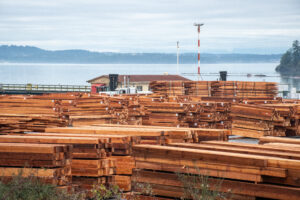 Many laid-off workers at Western Forest Products’ Chemainus sawmill are increasingly frustrated with the company for the delays in the reopening of the mill, and with the state of the coastal forest industry overall. Brian Bull, Randy Robertson and Robert Joyce, who collectively have 95 years working in the forest industry, have been laid off since WFP temporarily curtailed operations at the mill on June 18. WFP recently announced that the shutdown at the mill, which employees approximately 150 workers, would extend into 2026 due to poor market conditions, high American lumber tariffs, and log-supply issues. Robertson said the company has not given the workers any indication of when the mill will reopen. …Bull said the mill’s workers’… employment insurance benefits are running out and they’re only making about half of the money they make at the mill even with the EI benefits.
Many laid-off workers at Western Forest Products’ Chemainus sawmill are increasingly frustrated with the company for the delays in the reopening of the mill, and with the state of the coastal forest industry overall. Brian Bull, Randy Robertson and Robert Joyce, who collectively have 95 years working in the forest industry, have been laid off since WFP temporarily curtailed operations at the mill on June 18. WFP recently announced that the shutdown at the mill, which employees approximately 150 workers, would extend into 2026 due to poor market conditions, high American lumber tariffs, and log-supply issues. Robertson said the company has not given the workers any indication of when the mill will reopen. …Bull said the mill’s workers’… employment insurance benefits are running out and they’re only making about half of the money they make at the mill even with the EI benefits. 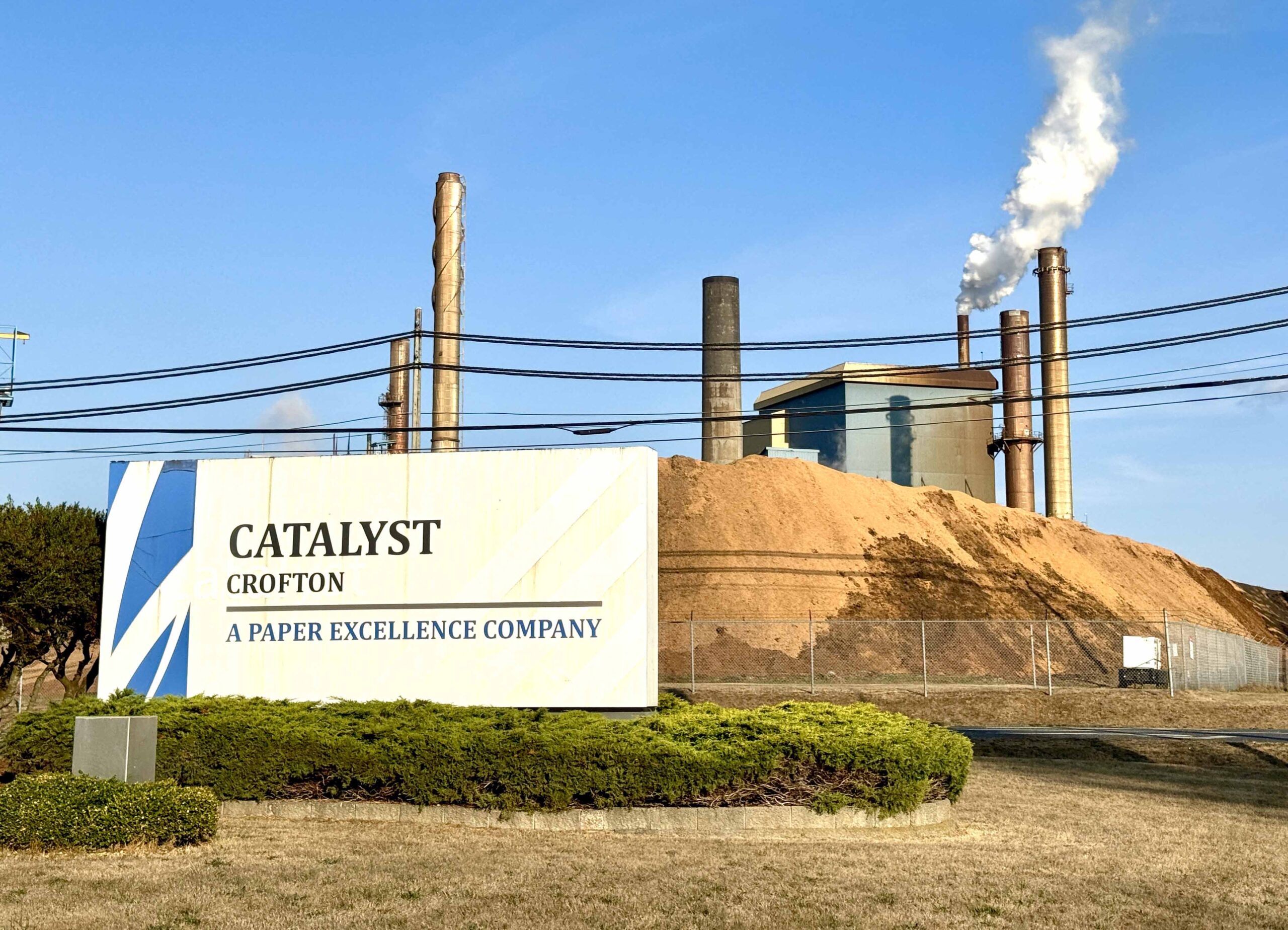 The province has retained an external consultant with expertise in the pulp and paper sector to assess options for the Crofton mill site, B.C.’s Forest Minister Ravi Parmar told North Cowichan’s council during a meeting on Dec. 10. Parmar also discussed the possibility of a new owner acquiring the property to resume pulp and paper production, or repurposing the property for another industrial use, the municipality said in a statement. “Given the significant implications for our community, we have requested that North Cowichan be actively involved at all stages of this work and in any discussions or decisions related to the future of the site,” North Cowichan said. North Cowichan Mayor Rob Douglas said they are continuing to work with the provincial and federal governments to secure transition funding and support for the mill workers.
The province has retained an external consultant with expertise in the pulp and paper sector to assess options for the Crofton mill site, B.C.’s Forest Minister Ravi Parmar told North Cowichan’s council during a meeting on Dec. 10. Parmar also discussed the possibility of a new owner acquiring the property to resume pulp and paper production, or repurposing the property for another industrial use, the municipality said in a statement. “Given the significant implications for our community, we have requested that North Cowichan be actively involved at all stages of this work and in any discussions or decisions related to the future of the site,” North Cowichan said. North Cowichan Mayor Rob Douglas said they are continuing to work with the provincial and federal governments to secure transition funding and support for the mill workers. Join industry, government, First Nations, and community leaders at the 2026 COFI Convention as we focus on rebuilding competitiveness and shaping a more resilient future for BC’s forest sector. British Columbia’s forest sector is at a crossroads — facing tough challenges, but also leading the way in solutions that matter most to our province: housing, wildfire resilience, reconciliation, and building a resilient provincial economy. At the 2026 COFI Convention, themed Forestry is a Solution, leaders from industry, government, First Nations, local government will come together to advance competitiveness and chart a strong, sustainable future for BC’s forest sector. Discounted hotel rates are nearly sold out, book now to secure conference pricing and guarantee your stay. April 8 – 10, 2026 | JW Marriott Parq in Vancouver
Join industry, government, First Nations, and community leaders at the 2026 COFI Convention as we focus on rebuilding competitiveness and shaping a more resilient future for BC’s forest sector. British Columbia’s forest sector is at a crossroads — facing tough challenges, but also leading the way in solutions that matter most to our province: housing, wildfire resilience, reconciliation, and building a resilient provincial economy. At the 2026 COFI Convention, themed Forestry is a Solution, leaders from industry, government, First Nations, local government will come together to advance competitiveness and chart a strong, sustainable future for BC’s forest sector. Discounted hotel rates are nearly sold out, book now to secure conference pricing and guarantee your stay. April 8 – 10, 2026 | JW Marriott Parq in Vancouver Forest Minister Ravi Parmar says proposed new zoning regulations in Nanaimo for heavy industries could have “extreme” consequences for a local pulp and power producer. …A motion by Nanaimo Coun. Paul Manly at a Nov. 17 meeting targets emission-intensive industries such as garbage and waste incineration facilities and chemical, petroleum and LNG plants. …“This is not anti-Harmac,” Manly said in an interview on Friday. …In a letter to Nanaimo’s mayor and council this week, Parmar said the motion sends the wrong signal at a time when the B.C. forest manufacturing industry is in a downward spiral. “This move could result in lost investment, confidence and assuredness in the local forest sector,” said Parmar, noting Harmac Pacific is a key driver of the local forest sector and a major employer in Nanaimo’s economy. “We need to be supporting our forestry operators, not punishing them. This motion is closer to the latter.”
Forest Minister Ravi Parmar says proposed new zoning regulations in Nanaimo for heavy industries could have “extreme” consequences for a local pulp and power producer. …A motion by Nanaimo Coun. Paul Manly at a Nov. 17 meeting targets emission-intensive industries such as garbage and waste incineration facilities and chemical, petroleum and LNG plants. …“This is not anti-Harmac,” Manly said in an interview on Friday. …In a letter to Nanaimo’s mayor and council this week, Parmar said the motion sends the wrong signal at a time when the B.C. forest manufacturing industry is in a downward spiral. “This move could result in lost investment, confidence and assuredness in the local forest sector,” said Parmar, noting Harmac Pacific is a key driver of the local forest sector and a major employer in Nanaimo’s economy. “We need to be supporting our forestry operators, not punishing them. This motion is closer to the latter.”






